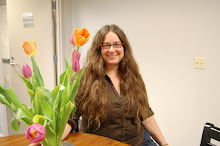Not ideal -- we only have an hour, at lunchtime, in a room whose huge table cannot move. It's raining, we've all had stressful mornings, one actor's pants leg is ripped, and the meeting before us ran long so we're late getting into the room.
We begin. Clear away the chairs, circle on the floor. We Check In, our ritual of entering the work. At the end, we'll Check Out. These two rituals create the sanctuary of rehearsal. This is especially necessary when you work in many spaces.
Okay. We're here.
I sketch our set on the whiteboard, draw my ideas for this scene. One actor, also an artist, adds a quick perspective drawing, to show how we could use the doors. We talk it through. Black and blue marker, swift drawings on top of each other. I used to draw just like this, on these same Microsoft boards, with animators on Xbox games. Once we've got the gist, we create a makeshift set from chairs, coats, and a corner of the mammoth table. Our Himalayan village street corner is born.
They've done text-analysis and are off-book, memorized. We set a rough blocking (who moves where, on which line), then run it in a variety of scenarios. She likes him, he wants her to go away. He likes her, she wants him to go away. At this point, we are all searching for the play. This is flexing, for an actor, warming into the world. Playing. "There's a reason we're called Players," as Mark Williams, my acting teacher, used to say.
The unconscious is not a beast you can approach head-on.
Stanislavski, the great theatre innovator, says (paraphrased), "Everything is easy when you're in the zone. The question is, How do you get in the zone?" His answer is, "You can only do it like Nature does it." Meaning, YOU can't grow a carnation. But you can plant one, water it, fertilize it, place it in the sun. If you're lucky, the carnation will grow itself. You do your part, Nature does the rest.
Ten minutes left. We're hot and loose. Time has slowed way down. (This is the first task of the director, to slow down time.) We've laughed, fought, discovered, hit our stride. Like ball players, you could throw us anything now, we could catch it.
"Let's swap," says one of the actors. They switch costumes and props, take their places. This time they will only say the OTHER person's lines, do the other person's moves.
The scene runs itself.
This is an astounding thing the actors just did. It means they know the whole scene well enough to play anyone in it. They own it now. This is the kind of work you can only do when you are Not Thinking. If you thought, trading places would be too scary, too hard.
We circle up for Check Out. "Peaceful, clean, happy. That was fun." "Relaxed. Hungry for the rest of the play." "Glad, hungry."
We restore the space -- always leave a theatre cleaner than you found it -- and leave.
Leonid Anisimov, Honored Artist of Russia, says,
"One good rehearsal can heal a city."Rehearsal is a process of spiritual purification. After such a rehearsal -- even a small one like this -- the participants leave cleaner. This affects their interactions, which in turn affects others. On the deeper level, such work is like prayer. It powerfully affects the unseen.
I am dissolving toward a different way of working -- more space, time, money, commitment. This is my last time here. Like summer school after your senior year of high school. No one notices. You look around one hot quiet day and realize you will never again walk past these cement pillars and fern-lined fountain with the carved killer-whale totem pole.
Childhood has ended.
I rehearse like some people meditate or run. It is a practice. Even if we only do it for an hour in a Microsoft conference room, that is a good hour. A good day.
Okay, chickies. I'm off to an apartment complex across town for my next one. This one's three hours long, with three actors.

No comments:
Post a Comment